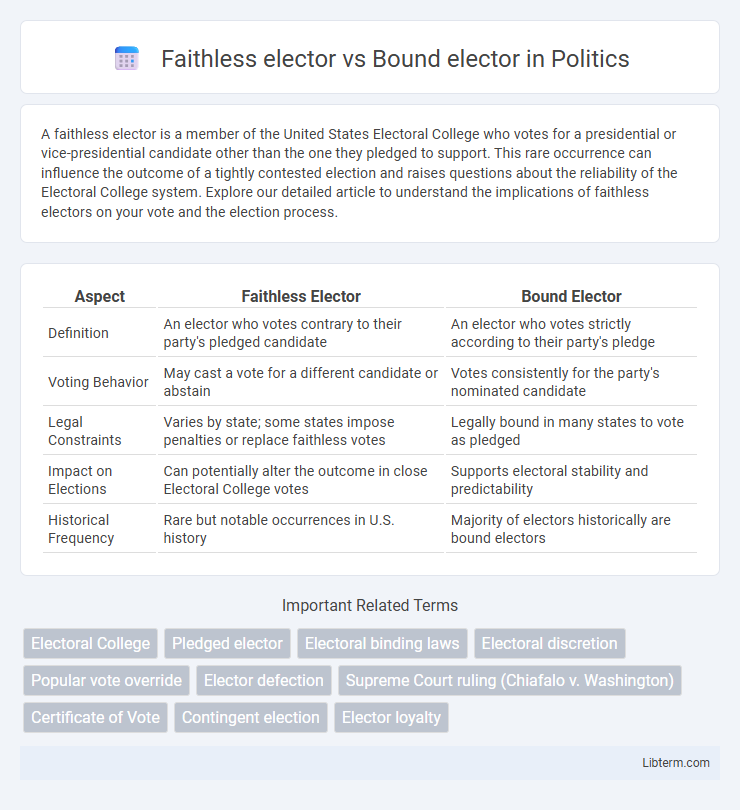A faithless elector is a member of the United States Electoral College who votes for a presidential or vice-presidential candidate other than the one they pledged to support. This rare occurrence can influence the outcome of a tightly contested election and raises questions about the reliability of the Electoral College system. Explore our detailed article to understand the implications of faithless electors on your vote and the election process.
Table of Comparison
| Aspect | Faithless Elector | Bound Elector |
|---|---|---|
| Definition | An elector who votes contrary to their party's pledged candidate | An elector who votes strictly according to their party's pledge |
| Voting Behavior | May cast a vote for a different candidate or abstain | Votes consistently for the party's nominated candidate |
| Legal Constraints | Varies by state; some states impose penalties or replace faithless votes | Legally bound in many states to vote as pledged |
| Impact on Elections | Can potentially alter the outcome in close Electoral College votes | Supports electoral stability and predictability |
| Historical Frequency | Rare but notable occurrences in U.S. history | Majority of electors historically are bound electors |
Introduction to Electoral College System
The Electoral College system in the United States consists of electors chosen by each state to formally elect the president and vice president. Bound electors are legally required to vote in accordance with their state's popular vote, whereas faithless electors cast ballots contrary to their pledge or state mandate. The presence of faithless electors highlights debates about the democratic nature and reliability of the Electoral College framework.
Definition of Faithless Elector
A faithless elector is a member of the United States Electoral College who votes for a candidate other than the one they pledged to support, defying the expectations of their state's popular vote. In contrast, a bound elector is legally or conventionally obligated to cast their vote according to their state's popular election results. Instances of faithless electors are rare but have sparked legal debates on the enforceability of electoral pledges.
Definition of Bound Elector
A bound elector is a member of the Electoral College who is legally or morally obligated to vote for the presidential candidate who won the popular vote in their state, reflecting the state's choice. This contrasts with a faithless elector, who votes contrary to their pledge or state's popular vote. Bound electors ensure adherence to the intended democratic outcome in the U.S. presidential election system.
Historical Instances of Faithless Electors
Faithless electors have historically appeared in U.S. presidential elections, such as the 2016 election where seven electors voted contrary to their state's popular vote, reflecting rare instances of deviation from the Electoral College system. Bound electors are required by law or pledge to vote in accordance with their state's popular vote, ensuring consistency in the electoral process. The Supreme Court ruling in Chiafalo v. Washington (2020) affirmed states' rights to enforce elector pledges, aiming to reduce the impact of faithless electors in future elections.
Legal Framework Governing Elector Obligations
The legal framework governing elector obligations varies significantly between faithless electors, who cast votes contrary to their state's popular vote, and bound electors, who are legally required to vote in accordance with that outcome. Federal and state laws, including Supreme Court rulings like Chiafalo v. Washington (2020), affirm states' rights to enforce elector pledges through penalties or vote replacement mechanisms. These legal structures aim to uphold the integrity of the Electoral College by reducing the risk of faithless voting and ensuring electors fulfill their designated roles as mandated by state statutes.
Consequences for Faithless Electors
Faithless electors, who cast votes contrary to their state's popular vote, face legal penalties and potential challenges to their eligibility in several states, ensuring the integrity of the Electoral College process. Bound electors are legally obligated to vote according to their state's popular vote, reducing the risk of electoral disputes and maintaining trust in the presidential election outcome. Consequences for faithless electors include fines, disqualification, or replacement, which deter deviation and uphold the principle of reflecting voter intent.
Arguments Supporting Bound Electors
Bound electors are crucial for maintaining the integrity of the Electoral College by ensuring electors vote according to their state's popular vote, which upholds democratic principles and voter trust. Arguments supporting bound electors emphasize preventing faithless electors from undermining election outcomes or swaying results against the electorate's choice, preserving political stability. Legal frameworks in many states enforce binding laws to penalize or replace faithless electors, reinforcing accountability and the legitimacy of presidential elections.
Debates Surrounding Electoral Independence
Faithless electors, who cast votes contrary to their state's popular vote, challenge the principle of bound electors mandated by state laws to reflect the electorate's choice. Debates surrounding electoral independence center on whether electors should exercise personal judgment or strictly adhere to voter mandates, raising questions about democratic representation and constitutional interpretation. Efforts to penalize or replace faithless electors highlight ongoing tensions between preserving electoral fidelity and protecting individual elector autonomy.
Impact on Presidential Elections
Faithless electors, who cast votes contrary to their state's popular vote, can introduce uncertainty and potentially alter the outcome of tight presidential elections. Bound electors, legally required to vote according to their state's popular vote, help maintain electoral predictability and uphold the democratic mandate. The impact of faithless electors remains rare but poses a risk to electoral legitimacy and voter trust in closely contested elections.
Future of Faithless vs Bound Electors
The future of faithless electors is uncertain as many states increasingly enforce binding laws that require electors to vote according to the popular vote, reducing opportunities for faithless voting. Legal challenges and Supreme Court rulings, such as Chiafalo v. Washington (2020), have affirmed states' rights to penalize or replace faithless electors, strengthening the trend toward bound electors. Consequently, the evolution of electoral laws suggests a declining role for faithless electors in the U.S. Electoral College system.
Faithless elector Infographic

 libterm.com
libterm.com